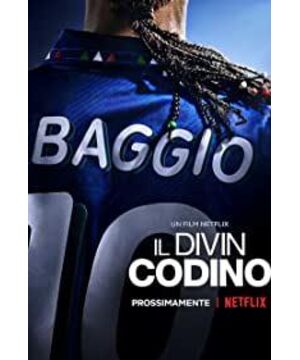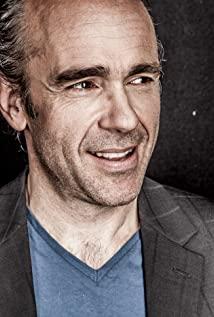It has been almost a week since the release of the 5.26 Baggio movie "The Magical Ponytail". The IMDB rating of 6.2 may be better with the accumulation and progress of time, but it is a relatively peaceful result for this film. I think it's been very successful, if you're going to see Baggio's entire career or his highlights in 90 minutes, this movie will definitely disappoint you, in fact I've seen quite a few on IMDB Similar reviews and very low ratings, they complained that the creative team did not show the great and brilliant side of Baggio, but I think this is not what the director of this film intends for the audience to see.
In fact, if you want to see how Baggio played in what era and how many great moments he created, there are actually a lot of real video materials that can be achieved. But for this film, the director chose to forego that content, and the several high points of Baggio's career that "The Magical Ponytail" chose were the low points of his life. Vicenza's serious injury, the loss of the 1994 World Cup final, and the loss of the 2002 World Cup, the director tried to show how a magical Baggio stood up again in the face of adversity. However, the atmosphere and focus of the film seem to be a bit sloppy, making it difficult for me to feel the surging power behind Baggio's calm.
In the film, there are many perfect reproductions of the career content of Baggio's autobiography, such as "Mom, if you love me, let me die" "Sacchi, you are a lunatic", but this choice between life and death is not It's a good way to extend the heart and emotions behind it. It seems to be re-enacted for the sake of re-enactment. The director team is a bit overly pursuing to realize the restoration of those scenes of Baggio. Vicenza was interviewed. The sweater, the 1994 World Cup in the player channel The stare of Romario, the somersault after scoring a goal, and taking Guardiola's captain's armband at Brescia, these iconic moments are familiar to Baggio fans. We have all experienced them together, but We can't experience the heart behind Baggio, which was originally what I wanted to see more from this film.
Or you can say that this film did not impress me on the road of Baggio's career, and it lacks the description of the highlights of Baggio's career. Without the contrast of success, those failures seem to be less unforgettable. In this respect the movie is only 90 minutes passable.
But the director has described another story in this film: how an ordinary father and a gifted son face those times in life that need to fight the past together.
In the face of Baggio's youthful fame, his father did not give too much praise, and even directly rejected the praise that the young Baggio wanted to hear. You are no better than your hard-working brother, which made Baggio unacceptable. After signing the contract with 2.070 billion lire, which was almost 1.5 million US dollars in 1985, his father only said lightly after hearing that "you can finally pay for the broken glass", which made the relationship between Baggio and his father more painful. fragile relationship.
Father of 8 finds out he has a gifted son, should he be more pampered? Obviously Baggio's father is not. He never expressed the slightest excitement about Baggio's talent and achievements. He buried these emotions that should be easily expressed in his heart and told his son that what you need is purpose and persistence.
Baggio, who came to Florence with a wounded leg, seems to need encouragement and support more than others, but his father just threw down the sentence "In a person's life, nothing should be taken for granted, and no one will give you something for nothing" leave indifferently. Talent does not mean achievement. The father who gave up being a cyclist because he lacked talent to support his family understands this truth, but for Baggio, who has just experienced the first highs and lows of his life at the age of 18, he may not understand. In which era, injuries would make many football geniuses mediocre, but Baggio did not. His father pushed his son in the opposite direction of ordinary people to realize his talent.
In order to participate in the 2002 World Cup, Baggio gave up the temptation of high salary in Japan and miraculously overcame the injury, but in the end he still could only get a negative answer, but this slump made a real dialogue between father and son .
I was afraid that you lacked perseverance, that you looked vulnerable, and seemed to play football just to get a compliment of "you're great", if that's your only goal.
I'm not the father of your dreams, but I have to prepare you for life, it's not easy for people like us who have nothing, and I did what I could to tell you that you're great.
Facing the genius son, his father did not choose to care and affirm, but used strong challenge and persistence to constantly urge Baggio to move forward on the road of becoming a legend.
There was an interview with Baggio himself before the film was released, and Baggio also talked about this topic: "In the beginning I regarded my father as an enemy, but instead he made me never give up. I am very grateful to him. Sometimes We don't understand the love and protection our parents showed us when we were kids, but over time we see things from their perspective. I know a lot of people have issues with their parents and I hope they renew that bond too."
Without this continuation bond, the film might just be a passable 90 minutes, but because of this bond, the film allows us to map a more authentic Baggio in the character of Baggio's father. Joe.
Compared with some good sports celebrity biopics I have seen before, such as "Race" by Jesse Owens, the famous American track and field athlete, and "42" by Jackie Robinson, the first black star of Major League Baseball, "Fantastic". "The Ponytail" lacks the background of the conflict of the era, and the director found an ordinary person's direction to give this film some new flashes.
I ended up giving this movie a 10 on IMDB because for me this is probably the last time Baggio's story gets attention and publicity in the mainstream media, and I cherish it.
View more about Baggio: The Divine Ponytail reviews











